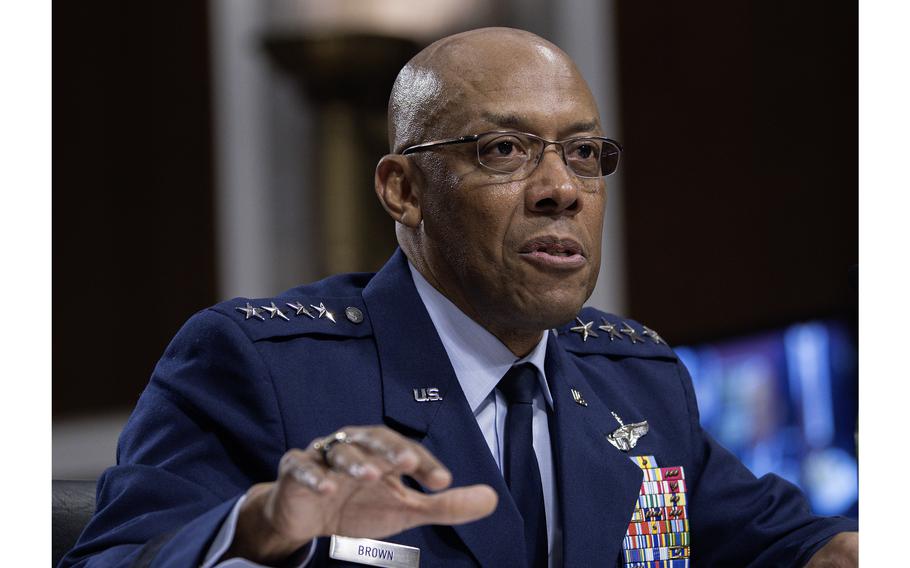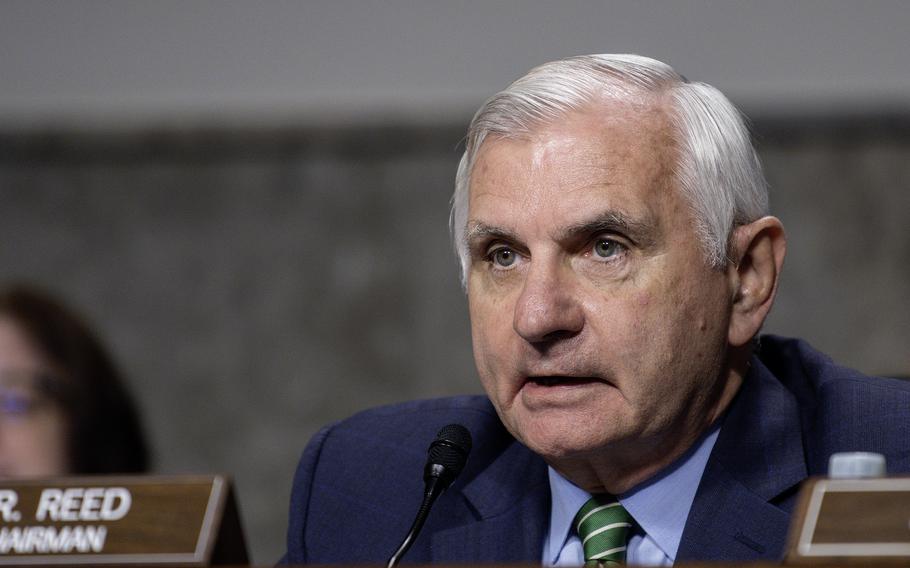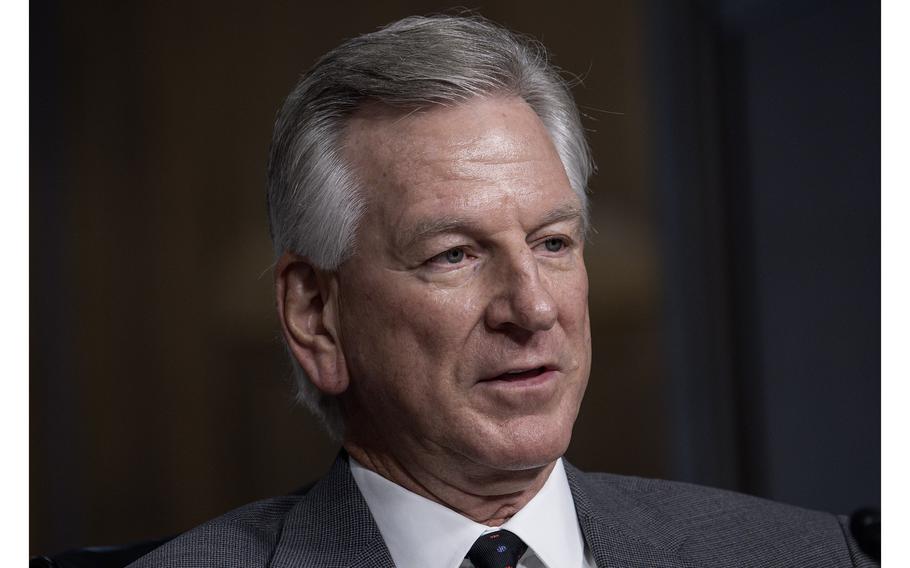
Air Force Gen. Charles Brown answers questions during a Senate Armed Services Committee hearing to consider his nomination to be chairman of the Joint Chiefs of Staff on Tuesday, July 11, 2023, on Capitol Hill in Washington. (Carlos Bongioanni/Stars and Stripes)
Gen. Charles “CQ” Brown, the Air Force chief of staff, vowed Tuesday to keep politics out of the military and stay nonpartisan if he is confirmed as the next top military officer in the country.
Brown, who is nominated to replace Army Gen. Mark Milley as chairman of the Joint Chiefs of Staff, told the Senate Armed Services Committee that he would set a “personal example” of being apolitical and would pass on that expectation throughout the force.
“We need to stay out of politics and stay nonpartisan, nonpolitical and at the same time advocate that our civilian leadership is not bringing us in into political situations,” he said. “We have to maintain a standard as part of the force and that’s what’s expected of the nation, for us as military members.”
Republican and Democratic lawmakers have complained the military is being increasingly dragged into political fights, contributing to an erosion of public confidence in the armed forces.
“Frankly, I am concerned about the health of our nation’s civil- and political-military relationships,” said Sen. Jack Reed, D-R.I., the committee’s chairman. “Civilian control of the military is a sacred duty that must be carried out responsibly, not be exploited.”

Sen. Jack Reed, D-R.I., chairman of the Senate Armed Services Committee, asks a question Tuesday, July 11, 2023, during a hearing on Capitol Hill in Washington, D.C., as the committee considered the nomination of Air Force Gen. Charles Brown to be the next chairman of the Joint Chiefs of Staff. (Carlos Bongioanni/Stars and Stripes)
Sen. Roger Wicker, R-Miss., the top Republican member of the committee, said he believed a lack of accountability for failures among military leaders and public engagement with politically divisive issues such as abortion and race have contributed to the distrust.
Brown highlighted his lack of extensive experience in Washington, D.C., as an asset that would offer a fresh perspective. A career fighter pilot, Brown logged more than 3,000 flight hours, including 130 hours in combat, and has led the Air Force since 2020.
“Having led warfighters abroad shapes my thinking,” he told the senators.
If confirmed, Brown will become just the second Black man, after Colin Powell, to serve as the president’s most senior military adviser and is expected to weigh in on security matters ranging from the war in Ukraine to China’s military buildup. His promotion would mean that alongside Defense Secretary Lloyd Austin, the Pentagon’s top two leaders would be filled by Black men for the first time in history.
Brown is the first Black person to lead any branch of the U.S. armed forces and previously commanded the Air Force in the Pacific and served as deputy commander for U.S. Central Command.
When asked about diversity, Brown said troops of all backgrounds and colors wanted fair opportunities to excel in the military but wanted to be rewarded for their performance.
His comments came amid efforts by some Republican lawmakers to dismantle the Pentagon’s diversity and inclusion programs.
“From my own career … flying F-16s, I didn't want to be the best African American F-16 pilot, I wanted to be the best F-16 pilot,” Brown said. “I did not want to be provided a position or promotion based on my background, I wanted it based on the quality of my work and I think that’s the aspect all of our service members look for.”
He defended a 2020 memo that he signed that supported expanding the pool of Air Force applicants to reflect the composition of the U.S. population, arguing he was not advocating for racial quotas as some critics claimed.
“It was just looking to open up opportunities to as many as we could,” Brown said.
As the top officer in the Air Force, Brown has placed an emphasis on racial justice and spoke about the impact of racism on his life in the military after the 2020 killing of George Floyd by a Minneapolis police officer sparked nationwide protests.
Brown commissioned into service in 1994, following in the footsteps of his father, a retired Army colonel who served in Vietnam. He initially intended to serve for four years but fell in love with flying fighter jets, according to his service biography.
He has been credited for an air campaign that helped push the Islamic State group out of Syria and Iraq and developed an expertise on the Indo-Pacific region that particularly appealed to lawmakers.
It is unclear how soon Brown can be confirmed as Joint Chiefs chairman as Sen. Tommy Tuberville, R-Ala., continues his hold on about 250 senior military promotions due to his objections to the Pentagon’s reproductive health policies. On Tuesday, Tuberville praised Brown’s service, including his 20 change-of-station moves.

Sen. Tommy Tuberville, R-Ala., attends a Senate Armed Services Committee hearing on Capitol Hill in Washington on Tuesday, July 11, 2023. (Carlos Bongioanni/Stars and Stripes)
Later in the hearing, Brown warned the monthslong stall on nominations will negatively impact families and cause the military to lose troops. Tuberville, a member of the Senate Armed Services Committee, was not in the room for Brown’s remarks.
“The spouse network is alive and well, and the spouses will compare notes," Brown said. "The member may want to serve, but the spouses and the families get a huge vote."
By law, Milley must leave the chairman position by Sept. 30. The Marine Corps on Monday was left without a confirmed leader for the first time in a century as a result of Tuberville’s hold.